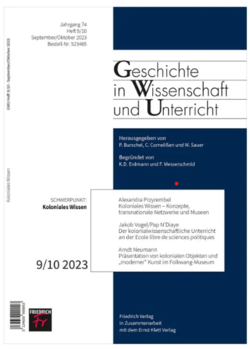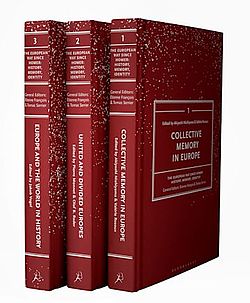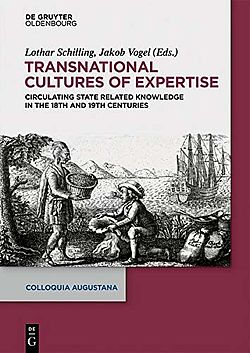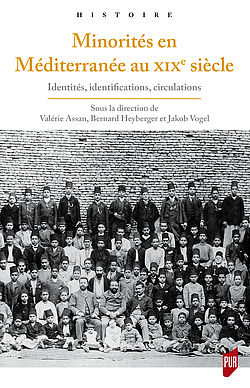Prof. Dr. Jakob Vogel | Assoziierter Forscher

Fachbereich
:
Geschichte
|
Biographie
Jakob Vogel war vom September 2018 bis August 2023 Direktor des Centre Marc Bloch..
Nach einer Lehre als Verlagskaufmann, einem Studium in Bonn und Paris und einem Studienabschluss an der Universität Paris VII wurde er 1995 an der FU Berlin mit einer Arbeit über den nationalen Militärkult in Deutschland und Frankreich zwischen 1871 und 1914 promoviert. Seit 2000 war er Wissenschaftlicher Assistent am Frankreichzentrum der TU Berlin, wo er 2005 habilitierte. Das aus der Habilitation entstandene Buch „Ein schillerndes Kristall. Eine Wissensgeschichte des Salzes zwischen Früher Neuzeit und Moderne“ (Köln 2008) wurde 2009 mit dem Buchpreis des Internetliste „H-Soz-Kult“ ausgezeichnet. Nach einer Zeit als Stellvertretender Direktor des Centre Marc Bloch ab 2006 wurde Jakob Vogel 2008 nach Köln zum Professor für Geschichte Europas und des europäischen Kolonialismus des 18. bis 20. Jahrhunderts berufen. Von dort aus wechselte er 2011 zu Sciences Po nach Paris, in dessen Rahmen er unter anderem im deutsch-französischen Studienprogramm von Sciences Po Nancy sowie im euro-afrikanischen Studienprogramm in Reims unterrichtete.
Seit 2020 ist Jakob Vogel Honorarprofessor am Institut für Geschichtswissenschaften der Humboldt Universität zu Berlin.
In seinen Forschungsarbeiten und Publikationen hat sich Jakob Vogel in vielfältiger Weise mit Themen und Fragen der europäischen Geschichte der Neuzeit und dem europäischen Kolonialismus beschäftigt. Als Spezialist der Geschichte eines „langen 19. Jahrhunderts“ hat er dabei die Rolle der Nation und des Nationalen wie auch der transnationalen Beziehungen und Verflechtungen Europas und der aussereuropäischen Welt thematisiert. Wesentlich mitbegründet und geprägt hat Jakob Vogel das dynamische Feld der „Wissensgeschichte“, die sich allgemeiner mit der sich wandelnden Stellung des Wissens in den modernen Gesellschaften beschäftigt. Ein Hauptaugenmerk galt in den letzten Jahren dabei der Zirkulation des Wissens und von akademisch gebildeten Experten im europäischen und kolonialen Rahmen, etwa in Afrika oder in Lateinamerika.
Anlässlich des 60. Geburtstags des scheidenden Direktors des Centre Marc Bloch, Jakob Vogel, wurde ein neuer Blog auf hypthèses.org veröffentlicht (initiiert von Nicolas Beaupré, Heinrich Hartmann, Benoît Majerus und Silke Mende): "Du franco-allemand à l'âge global". Die dort zunächst wöchentlich erscheinenden Beiträge nehmen die deutsch-französische Perspektive zum Ausgangspunkt, um sie transnational und global weiterzudenken.
Aktivitäten
Mitgliedschaft im Beirat des Instituts für Europäische Kulturgeschichte der Universität Augsburg.
Mitgliedschaft im Beirat des IFRA-SHS in Frankfurt.
Mitglied im Wissenschaftlichen Beirat der Deutsch-französischen Hochschule (2012-2020).
Assoziierter Forscher im CCEAE der Université Montréal.
Europäische und globale Zirkulationen des staatsbezogenen Wissens und der Experten (18.-20. Jahrhundert)
The European Way since Homer: History, Memory, Identity
Edition: Bloomsbury Academic
Collection: The European Way since Homer: History, Memory, Identity
ISBN: 9781350058552
Bringing together leading scholars from across Europe, as well as the United States, Africa and Asia, The European Way since Homer is a three-volume journey through the political, cultural, religious, intellectual, social and geographical history of Europe. It synthesises over 150 chapters on topics from across the spectrum of people, places, ideas, art, objects and events that have influenced the shaping of the continent. In turn, this rich tapestry provides us with unique insights into the nature of European identity, the importance of European heritage and the relationship that exists between Europe and the world beyond its boundaries.
Volume 3 investigates the different links between Europe and the rest of the world. There is a focus on Europe's imperial past, as well as the subsequent soft power of Europe and its constant commercial and cultural exchanges with others parts of the world.
https://www.bloomsbury.com/uk/european-way-since-homer-history-memory-identity-9781350058668/
Transnational Cultures of Expertise: Circulating State-Related Knowledge in the 18th and 19th centuries (Colloquia Augustana, Band 36)
30.September 2019Jakob Vogel , Lothar Schilling
Building on the new critical historiography about the evolution of the European state, the book analyses how administrators, scientists, popular publicists and other actors tried to redefine the realms of state action in the "Sattelzeit" (Koselleck). By focussing on the specific strategies of these actors and on the transnational circulation and dissemination of state related knowledge itself, the contributors of the book highlight the fluidity and the interconnections of the European debate in the crucial period of the development of the modern nationstate and its administration. They study the common European features of the evolution of a new type of statehood built upon multiple circulations and transfers that forged administrative practices in the different fields of state action. Analysing important fields of expertise ranging from agricultural knowledge, mining sciences to anthropological knowledge, which laid the basis for the new "scientific" foundations of administration, the book underlines the necessity of a re-evaluation of the classical approaches to the history of state in the 18th and 19th centuries.
Minorités en Méditerranée au XIXe siècle
07.März 2019Jakob Vogel , Valérie Assan, Bernard Heyberger
Collection: Histoire
ISBN: 978-2-7535-7592-9
L’actualité politique au Moyen-Orient, en Turquie et au Maghreb attire notre attention sur la question de la place des minorités dans les régions qui bordent la Méditerranée. La notion moderne de minorité a été généralement présentée par l’historiographie comme le résultat des débats des experts internationaux au lendemain de la Première Guerre mondiale. Or, la Méditerranée du xixe siècle constitue un terrain particulièrement fécond pour une analyse des multiples dynamiques de la construction des minorités. Cet ouvrage interroge les modalités de la fixation des identités par les États impériaux et par les minorités elles-mêmes. Il accorde une attention particulière à l’articulation entre les critères religieux, linguistiques, nationaux et territoriaux dans la catégorisation de ces identités collectives et individuelles. Il apporte un éclairage sur la mise en place de nouveaux modes d’administration des minorités, montrant les circulations et les transferts des normes et des pratiques, entre minorités au sein d’un même empire, mais aussi d’un empire à l’autre. Privilégiant l’approche comparatiste, ce livre collectif entend contribuer à une histoire croisée des minorités, en faisant dialoguer les historiographies de l’aire ottomane, des mondes coloniaux et de l’Europe.
Publikationen
Publikationen seit 2015
Monographien und Sammelbände
Lothar Schilling/ Jakob Vogel (Hg.), Transnational Cultures of Expertise. Circulating State-Related Knowledge in the 18th and 19th Ccentury, Berlin/Boston: De Gruyter, 2019.
Robert Salais, Marcel Streng, Jakob Vogel (Hg.), Qualitätspolitiken und Konventionen. Die Qualität der Produkte in historischer Perspektive, Berlin: Springer, 2019.
Valérie Assan, Bernard Heyberger, Jakob Vogel (Hg.), Minorités en Méditerranée au XIXe siècle. Identités, identifications, circulations, Paris, PUR, 2019
Etienne François, Thomas Serrier, Jakob Vogel u.a. (Hg.), Europa. Notre histoire, Paris: Les Arènes 2017 (verkürzte TB-Ausgabe Paris: Flammarion 2019 ; dt. Ausgabe : Europa. Die Gegenwart unserer Geschichte, 3 Bde., Darmstadt: WBG, 2019).
Marc Lazar, Jakob Vogel (Hg.), Themenheft „L'historien dans la Cité. Actualités d'une question classique“ der Zeitschrift Histoire@Politique 31 (2017), online unter:
http://www.histoire-politique.fr/index.php?numero=31.
Jean-Francois Chanet, Francois Cochet, Olivier Dard, Eric Necker, Jakob Vogel (Hg.), D'une guerre à l'autre. Que reste-t-il de 1870-71 en 1914?, Paris: Riveneuve 2016.
Davide Rodogno, Bernhard Struck, Jakob Vogel (Hg.), Shaping the Transnational Sphere. Experts, Networks and Issues from the 1840s to the 1930s, Oxford/New York: Berghahn 2015
Aufsätze in Zeitschriften und Sammelbänden
Lothar Schilling, Jakob Vogel, State-related Knowledge: Conceptual Reflections about the Rise of the Modern State, in: Lothar Schilling/ Jakob Vogel (Hg.), Transnational Cultures of Expertise. Circulating State-Related Knowledge in the 18th and 19th Ccentury, Berlin/Boston: De Gruyter, 2019, S. 1-17.
Jakob Vogel, Lost in Imperial Translation? Circulating Mining Knowledge between Europe and Latin America around 1800, in: Lothar Schilling, Jakob Vogel (Hg.), Transnational Cultures of Expertise. Circulating State-Related Knowledge in the 18th and 19th Ccentury, Berlin/Boston: De Gruyter, 2019, S. 129-147.
Robert Salais, Marcel Streng, Jakob Vogel, Einleitung: Qualitätspolitiken und Konventionen. Die Qualität der Produkte in historischer Perspektive (18.‒20. Jahrhundert), in: Robert Salais, Marcel Streng, Jakob Vogel (Hg.), Qualitätspolitiken und Konventionen. Die Qualität der Produkte in historischer Perspektive, Berlin: Springer, 2019, S. 1-41.
Jakob Vogel, „Buntes Steinsalz“ oder „Kali“? Die Erfindung eines Rohstoffes im 19. Jahrhundert, in: Robert Salais, Marcel Streng, Jakob Vogel (Hg.), Qualitätspolitiken und Konventionen. Die Qualität der Produkte in historischer Perspektive, Berlin: Springer, 2019, S. 97-122.
Valérie Assan, Jakob Vogel, Introduction : Une histoire croisée des minorités en Méditerranée, in: Valérie Assan, Bernard Heyberger, Jakob Vogel (Hg.), Minorités en Méditerranée au XIXe siècle. Identités, identifications, circulations, Paris, PUR, 2019, S. 9-21.
Jakob Vogel, Reno, in : Marc Lazar Mariuccia Salvati, Loredana Sciolla (Hg.), Europa, Bd. 3: Culture et società, Rom : Enciclopedia italiana, 2018, S. 14-21.
Jakob Vogel, Die Passage. Annäherungen des Historikers an ein analytisches Konzept, in: Burcu Dorgramaci, Elizabeth Otto (Hg.), Passagen des Exils / Passages of Exile, (Exilforschung. Ein internationales Jahrbuch 35/2017), München: Edition text + Kritik 2017, S. 24-38.
Jakob Vogel,„La Lorraine 1870 : la construction progressive d’un « espace de violence »“, in : Histoire@Politique 32 (2017), Themenheft „ Violences et espaces. Perspectives sur la Lorraine, 1870-1962“ hg. von Lucas Hardt, online unter
http://www.histoire-politique.fr/index.php?numero=32&rub=dossier&item=306
Marc Lazar, Jakob Vogel, „L'historien dans la Cité. Actualités d'une question classique. Introduction“, in : Histoire@Politique 31 (2017), online unter
http://www.histoire-politique.fr/index.php?numero=31&rub=dossier&item=299.
Jakob Vogel, Empire et nation. Un débat jamais tranché, in : Etienne François, Thomas Serrier, Jakob Vogel u.a . (Hg.), Europa. Notre histoire, Paris: Les Arènes 2017, S. 641-654 (dt. Ausgabe : Empire und Nation, eine nie geklärte Diskussion, in: Etienne François, Thomas Serrier, Jakob Vogel u.a. (Hg.), Europa. Die Gegenwart unserer Geschichte, Bd. 2, Darmstadt: WBG, 2019, S. 167-183).
Jakob Vogel, Introduction, L’Europe et le monde, le monde en Europe, in : Etienne François, Thomas Serrier, Jakob Vogel u.a. (Hg.), Europa. Notre histoire, Paris: Les Arènes 2017, S. 947-950 (dt. Ausgabe : Einführung: Europa und die Welt, die Welt in Europa, in: Etienne François, Thomas Serrier, Jakob Vogel u.a. (Hg.), Europa. Die Gegenwart unserer Geschichte, Bd. 3, Darmstadt: WBG, 2019, S. 9-13).
Isabelle Laboulais/Jakob Vogel, La construction du métier d'ingénieur des Mines à l'épreuve du terrain pendant la Révolution et l’Empire, in: Annales historiques de la Révolution française 385 (2016), p. 47-66
Jakob Vogel, Natürliche oder nationale Grenze? Nationalisierung eines transnationalen Stroms im 19. Jahrhundert, in. Kunst- und Ausstellungshalle der Bundesrepublik Deutschland und Marie-Louise von Plessen (Hg.), Der Rhein. Eine europäische Flussbiographie, München: Prestel 2016, S. 226-239.
Jakob Vogel, Les vétérans de la guerre de 1870/71 à la veille de la Première Guerre Mondiale, in: J.F. Chanet, F. Cochet, O. Dard, E. Necker, J. Vogel (Hg.), D'une guerre à l'autre. Que reste-t-il de 1870-71 en 1914?, Paris: Riveneuve 2016, S. 42-64.
Jakob Vogel, Stony Realms. Mineral Collections as Markers of Social, Cultural and Political Spaces in the 18th and Early 19th Century, in: Historical Social Research 40 (2015), S. 301-320.
Jakob Vogel, Reform unter staatlicher Aufsicht. Wirtschafts- und Sozialgeschichte des deutschen Bergbaus und des Salzwesens in der frühen Industrialisierung, in: Wolfhard Weber (Hg.), Geschichte des deutschen Bergbaus. Bd. 2: Salze, Erze und Kohlen. Der Aufbruch in die Moderne, Münster, 2015, S. 11-110
Davide Rodogno, Bernhard Struck, Jakob Vogel, Introduction, in: Davide Rodogno, Bernhard Struck, Jakob Vogel (Hg.), Shaping the Transnational Sphere. Experts, Networks and Issues from the 1840s to the 1930s, Oxford/New York: Berghahn 2015, S. 1-20.
Andere Publikationen
Jakob Vogel, Eric Stalner [Zeichnungen], Napoléon – Chronologix, Paris: Les Arènes, 2019.
Jakob Vogel, Le rêve inachevé de réunir les populations allemandes, in: Chantal Cabé, Michel Lefebvre (Hg.), L’atlas des peuples (Le Monde/La vie Hors-série, Nr. 26), Paris 2018, S.84-85.



